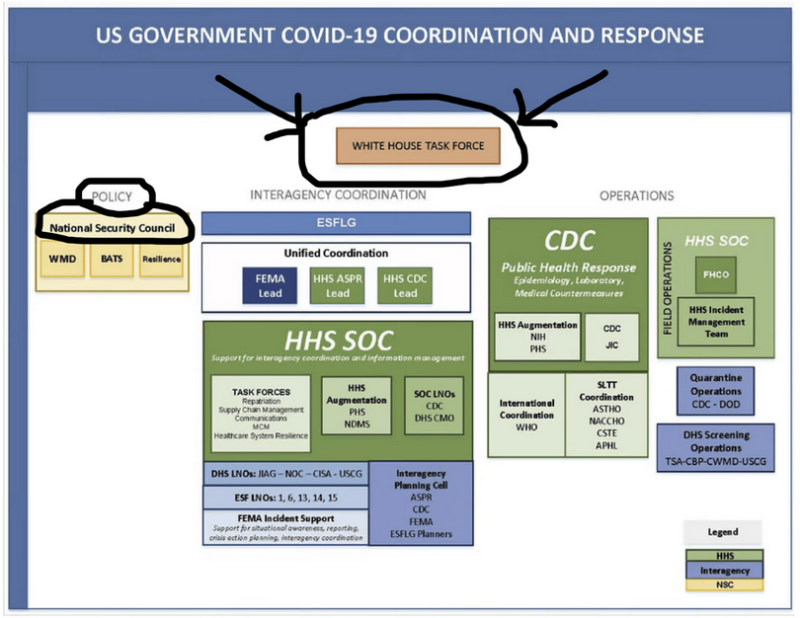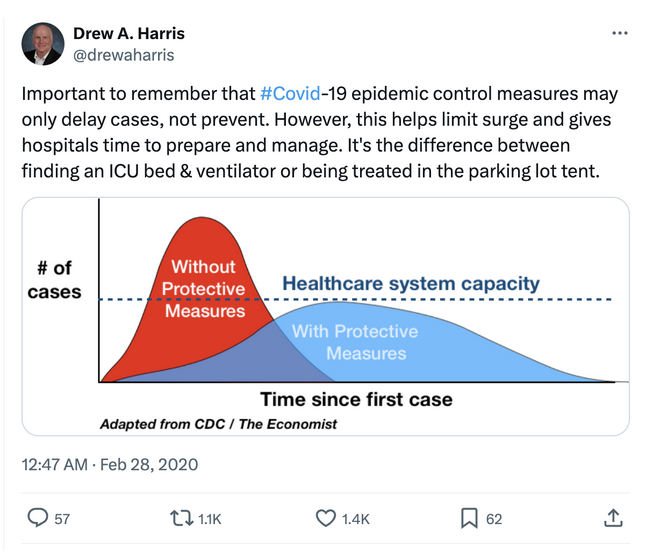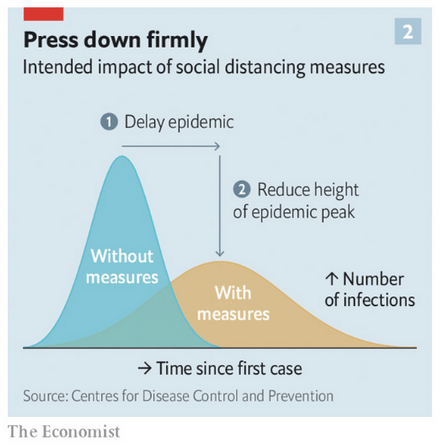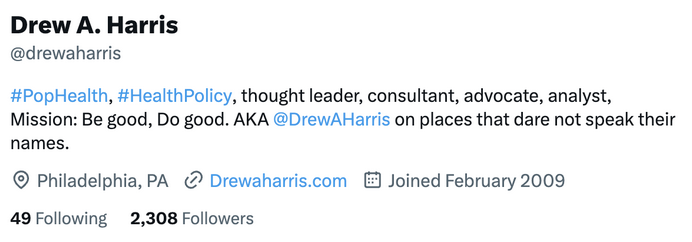February 27th, 2020, was a very strange day.
I did not know it at the time. I was preparing for a trip to Utah with my husband. I was vaguely aware that there was a virus of concern in China, but I wasn’t too worried about it. I was not even aware that the WHO had reported a total of 59 confirmed cases and zero deaths in the US from the virus on that day.
My husband wasn’t worried either. He was actually reassured by the official reaction to the virus, which was exactly what he had learned in medical school. Public health officials, politicians, and major media outlets were telling the public not to panic. The advice was: wash your hands a lot and stay home if you’re sick. That’s what the CDC, the WHO, Anthony Fauci, President Trump, and everyone in between was saying.
Everyone knew masks did not provide protection from airborne viruses. It was generally agreed that the draconian lockdowns in China were the product of totalitarian overreaction.
However, a radically different approach was about to be implemented. It was an approach concocted in the shadowy realm of biowarfare and bioterrorism, and it entailed fomenting panic in order to gain compliance with lockdowns until countermeasures became available.
The 27th of February is such a noteworthy date, because it’s when a jarring narrative flip occurred: reassurance and established protocols became suspect. Panic and doomsday predictions became the new norm. At the time, the shift was not immediately apparent. In retrospect, it is astonishing.
The following is a detailed analysis of some of the private communications, international events, and public propaganda narratives from February 27, 2020. All had the goal of priming the public for the heretofore unthinkable response to a novel pathogen: lock everything down and wait for vaccines.
Private Messaging by Top Officials: Expect Lockdowns
Dr. Anthony Fauci
On February 27th, 2020, Anthony Fauci, the public health face of the not-yet-pandemic response, did a 180 in his private communications (which became available many months later through Freedom of Information Requests).
As reported by Jeffrey Tucker:
On February 26, Fauci was writing: “Do not let the fear of the unknown…distort your evaluation of the risk of the pandemic to you relative to the risks that you face every day…do not yield to unreasonable fear.”
The next day, February 27, Fauci wrote actress Morgan Fairchild: “Be prepared to mitigate an outbreak in this country by measures that include social distancing, teleworking, temporary closure of schools, etc.”
What changed between the 26th and the 27th to make Fauci change his messaging so drastically? Nothing about the virus was different. But the switch from a measured public health to a brutal bioterrorism response had been thrown. The new paradigm, which Fauci began to explain in private and the media began to blast to the public (see below) was: start panicking and prepare for lockdowns.
Senator Richard Burr
Senator Burr, who was serving as Chair of the Senate Intelligence Committee at the time, was caught in a secret recording from February 27th, 2020, making prescient lockdown predictions.
As reported by NPR:
On Feb. 27, when the United States had 15 confirmed cases of COVID-19 [NPR had even lower numbers than the WHO], President Trump was tamping down fears and suggesting that the virus could be seasonal.
On that same day, Burr attended a luncheon held at a social club called the Capitol Hill Club. And he delivered a much more alarming message.
‘There’s one thing that I can tell you about this: it is much more aggressive in its transmission than anything that we have seen in recent history,’ he said, according to a secret recording of the remarks obtained by NPR. ‘It is probably more akin to the 1918 pandemic.’
Sixteen days before North Carolina closed its schools over the threat of the coronavirus, Burr warned it could happen.
And Burr invoked the possibility that the military might be mobilized to combat the coronavirus.
What did Burr know that even President Trump did not?
Burr was a member of the “Gang of Eight” – the top lawmakers on the Senate and House intelligence committees. And, as reported by Just Security:
The U.S. intelligence community is able to share the nation’s most sensitive secrets with this small group without anyone else outside the administration knowing.
In addition, Senator Burr was closely allied with biowarfare operative Robert Kadlec, with whom he had created ASPR – the biodefense sub-agency within HHS – and BARDA, the Biomedical Advanced Research and Development Authority, which was responsible for developing countermeasures to bioterrorism. [ref]
International Lockdown Warnings and Shifts Toward Panic Policy
On February 27th, 2020, a surprising number of countries made major changes, or surprising announcements, in their response to the novel coronavirus:
In England, which had been following the same established public health guidelines as the United States, the Guardian reported, in an article entitled, UK schools and offices could close for up to two months: “Prof Chris Whitty [the government’s Chief Scientific Advisor] said the country should prepare to face disruption to many normal activities ‘for quite a long period’ and to pay a heavy ‘social cost’ for efforts to thwart the virus.”
In Australia, as reported by the Guardian: “PM initiates emergency response plan as Australia prepares for global pandemic.” The plan, according to the article, included “mass vaccinations and stadium quarantines.”
In Japan, “Prime Minister Shinzo Abe took the drastic step of asking all the country’s schools to close for about a month.” The move, as reported by France 24, “which would make Japan one of a few countries, including China, to suspend classes nationwide, appeared to be an abrupt reversal of the more cautious stance the administration had taken on the virus.”
In France, President Emmanuel Macron said the country was “preparing for a jump in the number of coronavirus cases.”
In Germany, as reported by German broadcaster DW: “The government has announced a new crisis team to handle its response to the spread of the disease.”
As the case and death counts demonstrate, there was nothing particularly scary about what the virus was doing in each country on that day. Yet all these governments, on the same day, started preparing for “jumps” in cases, long lockdowns, quarantines, and vaccines.
U.S. Covid Task Force – Change in Leadership
In the United States, February 27th, 2020, was the day on which leadership of the pandemic Task Force, the group in charge of the entire US government’s pandemic response, got transferred from HHS secretary, Alex Azar, to the new “Coronavirus Response Coordinator” and National Security Council representative, Deborah Birx.
Here’s how this was reported by the White House:
“Today, Vice President Mike Pence announced the following individual to a key position on his team to combat the spread of the Coronavirus:
Ambassador Deborah Birx, to serve as the White House Coronavirus Response Coordinator.
Ambassador Birx is a world-renowned global health official and physician. She will be detailed to the Office of the Vice President and will report to Vice President Mike Pence. She will also join the Task Force led by Health and Human Services Secretary Alex Azar. She will be supported by the National Security Council staff.”
It’s important to note that on the Covid response org chart, the Task Force is placed above all the other agencies, including HHS. Birx is not just “joining the Task Force” – she is replacing Azar as the de facto leader of the response. And she is “supported” not by the staff of the Vice President or the HHS, but by the National Security Council, which is in charge of the response policy.


The fact that this happened on February 27th is particularly relevant because, on the same day, responsibility for all government communications about the not-yet-pandemic were diverted from the public health agencies to the Task Force, now controlled by the National Security Council.
Covid Communications Must Go Through VP/Task Force
As reported by the New York Times,
“The White House moved on Thursday [February 27, 2020] to tighten control of coronavirus messaging by government health officials and scientists, directing them to coordinate all statements and public appearances with the office of Vice President Mike Pence, according to several officials familiar with the new approach.”
This means that starting on February 27th, the public health agencies could no longer communicate about the virus, or the response, directly with the public. It all had to go through the National Security Council-led Task Force.
Propaganda-Industrial Complex
It is fascinating to note that on the same day when the key change in Covid response leadership and communications happened, several central themes and figures in the Covid propaganda campaign also emerged:
NYT Op-Ed by EcoHealth Alliance’s Peter Daszak
In a February 27, 2020, op-ed that is now findable only if you already know the URL (it is not listed anywhere on the New York Times site), Peter Daszak, the person most closely identified with the probable creation of SARS-CoV-2 in a Wuhan bioweapons lab, wrote this:
“In early 2018, during a meeting at the World Health Organization in Geneva, a group of experts I belong to (the R&D Blueprint) coined the term “Disease X”: We were referring to the next pandemic, which would be caused by an unknown, novel pathogen that hadn’t yet entered the human population.”
“In a nutshell, Covid-19 is Disease X.”
“The looming pandemic will challenge us in new ways, as people try to evade quarantines, and misinformation campaigns and conspiracy theorists ply their trade in open democracies.”
“Pandemics are like terrorist attacks: We know roughly where they originate and what’s responsible for them, but we don’t know exactly when the next one will happen. They need to be handled the same way — by identifying all possible sources and dismantling those before the next pandemic strikes.”
We Knew Disease X Was Coming. It’s Here Now.
You can read more about Peter Daszak in my article on the lab leak and the countermeasures.
NYT Podcast by Pandemic Panic-Meister Donald McNeil Jr.
In his February 27, 2020, podcast Donald McNeil Jr., a science and health reporter for the New York Times specializing in pandemics said:
“I’m trying to bring a sense that if things don’t change, a lot of us might die. If you have 300 relatively close friends and acquaintances, six of them would die in a 2.5 percent mortality situation.”
“We can do it, but we’re not used to being controlled from the top down the way people have been in China. So I don’t know what’s going to happen in the United States. We’re not mentally prepared to fight a sort of people’s war against an epidemic, which is what happened in China.”
This is an incredibly scary prediction from someone whose New York Times bio says he specializes in “plagues and pestilences” and who “covers diseases of the world’s poor and wider epidemics, including Covid-19, AIDS, Ebola, malaria, swine and bird flus and Zika.”
It is also at best ignorant and, at worst, intentionally fear-mongering. There was no credible reason to believe that 2.5% of the entire population would die of Covid-19. That would mean 9 million deaths in the United States alone.
Obviously, this is neither realistic nor is “mortality situation” the correct scientific way to refer to fatality rates, as McNeil surely knows, given his many years of writing about plagues.
In fact, when McNeil aired the podcast, it was already known that the fatality rate was as low as the flu for most age groups. Anthony Fauci himself co-wrote an article in the New England Journal of Medicine, which appeared online on February 28th (presumably having been written a few days prior):
“If one assumes that the number of asymptomatic or minimally symptomatic cases is several times as high as the number of reported cases, the case fatality rate may be considerably less than 1%. This suggests that the overall clinical consequences of Covid-19 may ultimately be more akin to those of a severe seasonal influenza (which has a case fatality rate of approximately 0.1%) or a pandemic influenza (similar to those in 1957 and 1968)…”
In all of his writing on the pandemic after February 27th, McNeil consistently hyped fear of the virus, of “misinformation” about it, and of other pathogens.
Scientific American Article by Pandemic Propagandist Zeynep Tufekci
On February 27th, 2020, an obscure sociologist named Zeynep Tufekci, who rocketed to international fame as a highly celebrated Covid “expert”, appeared on the scene with her Scientific American article “Preparing for Coronavirus to Strike the U.S. – Getting ready for the possibility of major disruptions is not only smart; it’s also our public duty.”
Here is a particularly noteworthy paragraph:
“All of this means that the only path to flattening the curve for COVID-19 is community-wide isolation: the more people stay home, the fewer people will catch the disease. The fewer people who catch the disease, the better hospitals can help those who do. Crowding at hospitals doesn’t just threaten those with COVID-19; if emergency rooms are overwhelmed, more flu patients, too, will die because of lack of treatment, for example.”
[BOLDFACE ADDED]
Note the mention of “flattening the curve” – a term that only appeared as a meme via Twitter (see below) on the same day this article came out, and only circulated widely several days/weeks after. How would readers know what “flattening the curve for COVID-19” meant here? Was it mere happenstance that Tufekci used this as-yet unfamiliar phrase on the same day the Twitter meme appeared?
I don’t know for sure, but I’m guessing it was not a coincidence.
Other statements and actions by Tufekci suggesting she did not spontaneously come up with her Covid pronouncements include:
In a podcast interview with Sam Harris, dated February 1, 2021, she claimed she wrote the Scientific American article because everyone who had any credentials – epidemiologists, infectious disease experts, even the mainstream media – was telling the public to remain calm and not to panic. But with her background in computers and sociology, she was certain people had to prepare to “stay home for a few weeks.”
After this initial article, Tufekci went on to supposedly single-handedly convince the CDC and the WHO to change their masking policies, by publishing an op-ed in the New York Times that went against all established science and all previous studies on masking.
In other words, following Tufekci – who wrote articles directly contradicting all the experts and established epidemiological knowledge, with no training in any related field herself – became “following the science” in the weeks and months after February 27th.
The Economist/Flatten the Curve
A little after midnight between February 27th and 28th, 2020, a formerly unknown podiatrist-turned-public-health expert, who had found his way to a leadership position in the biodefense-industrial complex in New Jersey in the years following 9/11, tweeted out a graph that was perhaps the single most important propaganda prop for the lockdown panic:


There are many strange things about this tweet and how it “went viral,” suggesting that Dr. Harris was probably just a conduit for the propaganda-industrial-complex, which sent it out on that night, and then blasted it around the globe a few weeks later.
Here are some clues that support this hypothesis:
- Dr. Harris’s CV shows an abrupt and heavily funded switch from podiatry to biodefense right after 9/11.
Training:
- 1983 Doctor of Podiatric Medicine (i.e., podiatrist — a doctor who treats feet)
- 1999 Master of Public Health
Experience:
- 1984-2001 Podiatric Medicine, private practice
- 2001-2004 University of Medicine & Dentistry of New Jersey, Executive Director for Special Projects for Sr VP for Academic Affairs. Coordinator, UMDNJ’s Bioterrorism response efforts
- 2004-2008 Director, Public Health Leadership Initiative for Emergency Response
- 2004-2008 Assistant Director, NJ Center for Public Health Preparedness at UMDNJ
According to Wikipedia:
The Centers for Public Health Preparedness (CPHP) program was established in 2000 by the Centers for Disease Control and Prevention (CDC) to strengthen bioterrorism and emergency preparedness by linking academic expertise to state and local health agency needs.
These centers were awarded through a competitive submission process…[2] to build a response to the events on September 11, 2001.
From 2004 to 2010, the CDC gave $134 million in funding to the Centers for Public Health Preparedness (CPHP) Cooperative Agreement program; 27 CPHPs within accredited schools of public health received the funds.
- 2008-2010 President, NJ Association for Biomedical Research
This last item is very strange. What qualifies a podiatrist with a Masters in Public Health to head up a Biomedical Research Association? I’m reminded of BARDA – the Biomedical Advanced Research and Development Authority mentioned in the section on Senator Burr above, which was created in 2005 to develop countermeasures to bioterrorism.
Dr. Drew’s funding also highlights the importance of bioterrorism response efforts in his career: Of the 15 items listed under ‘SUPPORT,’ eleven are between $5,000 and $50,000. Then there are three items related to the Center for Public Health Preparedness (see above), with a total value of over $2.3 million.
- Dr. Drew claims a graph he saw in The Economist as one of his sources, but the graph appeared in an article dated February 29th – and can at most be backdated to the 27th.
The print edition of The Economist, dated February 27, 2020, featured an authorless article entitled “Going Global” — online title: “The Virus Is Coming.”
This article does not include any “flatten the curve” imagery. It uses the awkward term “flatten the spike” in discussing how China managed the pandemic.
It does, however, link to a second article: “Covid-19 is now in 50 countries, and things will get worse, dated February 29th, which contains this graphic:


A March 27th New York Times article suggests that Dr. Harris managed to see the second article on February 27th (even though it’s dated February 29th), fly from Portland, Oregon, to Philadelphia, redesign the graph, and tweet it out, all by a little after midnight:
“At the end of February, Drew Harris, a population health analyst at Thomas Jefferson University in Philadelphia, had just flown across the country to visit his daughter in Eugene, Ore., when he saw an article on his Google news feed. It was from The Economist, and was about limiting the damage of the coronavirus.”
“Dr. Harris was waiting for his return flight in Portland when the first Oregon coronavirus case was announced; he had dinner at a busy airport bar and thought about how quiet the place would be in a week or two when the reality of the outbreak set in. Once home, he recreated his graphic and posted it on Twitter and LinkedIn, and was pleased to see the enthusiastic interest in flattening the curve.”
“‘Now I know what going viral means,’ Dr. Harris said.”
- The famous tweet had minimal engagement on Dr. Harris’s generally very low-engagement Twitter feed.
Here’s what his Twitter profile looks like:


Most of his posts have little to no engagement, even now after he supposedly became a Covid hero. The “flatten the curve” post has 57 comments, none of which (as far as I can tell) were posted before March 6th. None of the comments has any engagement.
On March 13th there are multiple comments, stating that the post will appear in articles that day in: Fast Company, Forbes, Washington Post, People, and NPR.
On LinkedIn the same post has 4 comments and 13 reposts.
Somehow, this initially little-noticed tweet from February 27th became a global sensation.
Of particular note is that it was republished simultaneously in at least 5 different nationally prominent media outlets on March 13th, the date of President Trump’s National Emergency Declaration, and the date of the Pan-CAP-A.
I believe it is very difficult to dismiss all those simultaneous publications of a hitherto unnoticed tweet, magically created by a completely unknown individual with no social media presence, as coincidence.
Conclusion
As the “novel coronavirus” spread throughout the world in the early months of 2020, two diametrically opposed responses to such a virus were in play:
The public health response, which was initially followed everywhere except China, involved telling the public not to panic, wash hands, and stay home when sick. This was standard protocol for a novel flu-like virus.
Behind the scenes, the biodefense-industrial-complex was gearing up for a bioterrorism response: quarantine-until-vaccine.
On February 27th, the bioterrorism response went public. A few weeks later, much of the world went into lockdown, convinced by a global propaganda campaign that this was the only appropriate response.
Republished from the author’s Substack
Join the conversation:


Published under a Creative Commons Attribution 4.0 International License
For reprints, please set the canonical link back to the original Brownstone Institute Article and Author.









